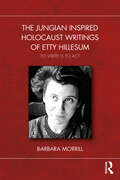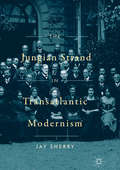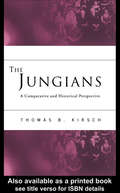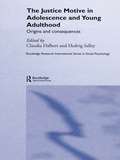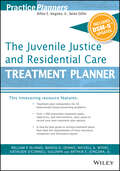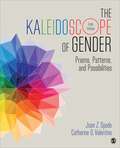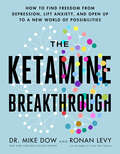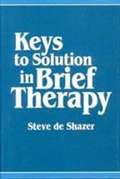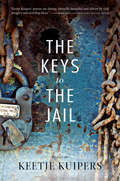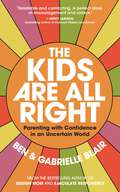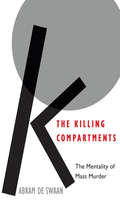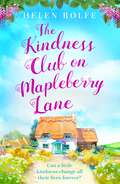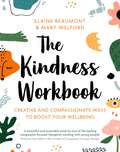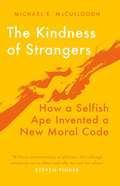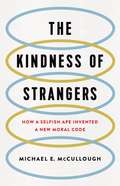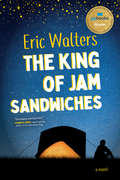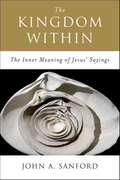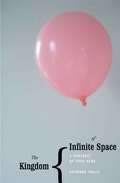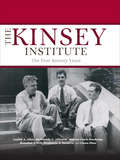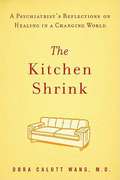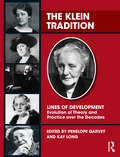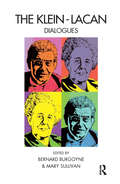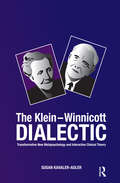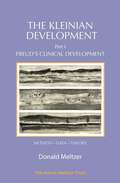- Table View
- List View
The Jungian Inspired Holocaust Writings of Etty Hillesum: To Write is to Act
by Barbara MorrillWithin this fascinating new book, Barbara Morrill analyses the journal writings of Etty Hillesum, a young Jewish woman in the 1940s, as she began analysis with a Jungian oriented practitioner in 1941.While Anne Frank is an inspirational figure, little is known about Etty Hillesum, also from Amsterdam, who kept a diary recounting her life and experiences during early World War II. This book is a compelling example of how we can use Etty Hillesum’s writings in the present to stand firm against the problems we’re currently facing globally. Being a Jungian oriented Integral psychologist and professor, the author examines what Hillesum recorded in her time, as well as employing Etty’s ideas to illuminate the chaos in our time. She explores Hillesum’s own process of individuation and realization, encouraging others to “develop yourselves!”This will be a unique volume of interest to Jungian analysts, analysts in training, as well as readers with an interest in the time period and concern about democracy and “our times.”
The Jungian Strand in Transatlantic Modernism
by Jay SherryIn studies of psychology’s role in modernism, Carl Jung is usually relegated to a cameo appearance, if he appears at all. This book rethinks his place in modernist culture during its formative years, mapping Jung’s influence on a surprisingly vast transatlantic network of artists, writers, and thinkers. Jay Sherry sheds light on how this network grew and how Jung applied his unique view of the image-making capacity of the psyche to interpret such modernist icons as James Joyce and Pablo Picasso. His ambition to bridge the divide between the natural and human sciences resulted in a body of work that attracted a cohort of feminists and progressives involved in modern art, early childhood education, dance, and theater.
The Jungians: A Comparative and Historical Perspective
by Thomas B. KirschThe Jungians: A Comparative and Historical Perspective is the first book to trace the history of the profession of analytical psychology from its origins in 1913 until the present.As someone who has been personally involved in many aspects of Jungian history, Thomas Kirsch is well equipped to take the reader through the history of the 'movement', and to document its growth throughout the world, with chapters covering individual geographical areas - the UK, USA, and Australia, to name but a few - in some depth. He also provides new information on the ever-controversial subject of Jung's relationship to Nazism, Jews and Judaism. A lively and well-researched key work of reference, The Jungians will appeal to not only to those working in the field of analysis, but would also make essential reading for all those interested in Jungian studies.
The Justice Motive in Adolescence and Young Adulthood: Origins and Consequences (Routledge Research International Series in Social Psychology #Vol. 8)
by Claudia Dalbert Hedvig SallayThis book provides a unique overview of the development of justice-related beliefs in different socialization contexts, and also of the role this plays in protecting mental health and promoting career development for adolescents and young adults. A range of European contributors bridge the conceptual gap between social and developmental psychological perspectives and use a number of original case-studies. This book provides new insights for justice psychology and adds new and important perspectives to studies on youth development.
The Juvenile Justice and Residential Care Treatment Planner, with DSM 5 Updates (PracticePlanners)
by Arthur E. Jongsma Jr.This timesaving resource features: Treatment plan components for 28 behaviorally based presenting problems Over 1,000 prewritten treatment goals,objectives, and interventions—plus space to record your own treatment plan options A step-by-step guide to writing treatment plans that meet the requirements of most insurance companies and third-party payors The Juvenile Justice and Residential Care Treatment Planner provides all the elements necessary to quickly and easily develop formal treatment plans that satisfy the demands of HMOs, managed care companies, third-party payers, and state and federal review agencies. Saves you hours of time-consuming paperwork, yet offers the freedom to develop customized treatment plans for juvenile clients Organized around 28 main presenting problems, from depression and abandonment issues to truancy, substance abuse, family instability, and others Over 1,000 well-crafted, clear statements describe the behavioral manifestations of each relational problem, long-term goals, short-term objectives, and educational interventions Easy-to-use reference format helps locate treatment plan components by behavioral problem or DSM-5™ diagnosis Includes a sample treatment plan that conforms to the requirements of most third-party payers and accrediting agencies (including HCFA, TJC, and NCQA)
The Kaleidoscope of Gender: Prisms, Patterns, and Possibilities (Fifth Edition)
by Joan Z. Spade Catherine G. ValentineIn this anthology, scholars explain how the complex, evolving pattern of gender is constructed interpersonally, institutionally, and culturally, and challenges students to question how gender shapes their daily lives.
The Ketamine Breakthrough: How to Find Freedom from Depression, Lift Anxiety, and Open Up to a New World of Possibilities
by Dr. Mike Dow Ronan LevyNew York Times best-selling author Dr. Mike Dow and Ronan Levy, founder of Field Trip, the world's largest provider of psychedelic-assisted psychotherapies, offer ways to integrate ketamine into treatment for depression, anxiety, PTSD, and more.It&’s been described as the most important breakthrough in mental health since the introduction of Prozac in 1986. And though once considered taboo, the psychedelic compound, ketamine, is experiencing a spectacular therapeutic comeback.When combined with psychotherapy, ketamine, which has been described as the being possibly the &“most important breakthrough in antidepressant treatment in decades,&” has the potential to treat depression, anxiety, PTSD, and other debilitating mental illnesses—and change lives.Unlike antidepressants, which merely mask the pain, psychedelics that heal the brain are the future. Instead of putting Band-Aids on the brain, with Ketamine Assisted-Psychotherapy, you can actually repair the neurological damage caused by stress, anxiety, neglect, and abuse.In this book, best-selling author Dr. Mike Dow and Field Trip co-founder Ronan Levy provide a broad overview of where KAP came from, how it works, who it works for, and what to expect. More importantly, The Ketamine Breakthrough gives specific protocols for both practitioners and patients to follow in their work with KAP.This book contains hope for those diagnosed with treatment-resistant depression, plagued by trauma and frozen by fears. Ketamine-assisted psychotherapy has also proven effective for people with drug, alcohol, and behavioral addictions, existential depression, grief, and just feeling stuck. People with unresolved resentments, anger, and the everyday anxieties of modern life will also benefit. Ketamine-assisted psychotherapy has been enormously helpful with couples, groups, and veterans, which will be addressed in the book as well.This is the go-to manual for therapists and anyone who wants to learn more about Ketamine-Assisted Psychotherapy. For those undergoing this revolutionary protocol, it includes a session-by-session Ketamine-Assisted Psychotherapy Workbook to enhance and deepen the treatment.
The Keys To Solution In Brief Therapy
by Steve De ShazerJoin de Shazer behind the on-way mirror for a fascinating journey into the land of brief therapy, where the emphasis is not on how problems arise, but on how to solve them. His case examples read like well-written detective novels, and his concept of 'skeleton key' interventions is both provocative and promising. This is a book that is firmly grounded in the tradition of Milton Erickson, but that extends Erickson's work into new areas.
The Keys to the Jail (American Poets Continuum)
by Keetje KuipersThe Keys to the Jail asks the question of who is to blame for all we’ve lost, calling us to reexamine the harsh words of failed love, the aging of a once-beautiful body, even our own voracious desires. Keetje Kuipers is a poet of daring leaps and unflinching observations, whose richly textured lyrics travel from Montana’s great wildernesses to the ocean-fogged streets of San Francisco as they search out the heart that’s lost its way.Dolores ParkIn the flattening California dusk,women gather under palms with their bagsof bottles and cans. The grass is featheredwith the trash of the day, paper napkinsblowing across the legs of those who stilldrown on a patchwork of blankets. Shirtlessin the phosphorescent gloom of streetlamps,they lie suspended. This is my one goodlife-watching the exchange of embraces,counting the faces assembled outsidethe ice-cream shop, sweet tinge of urine bythe bridge above the tracks, broken bike lockof the gay couple’s hands, desperate clappingof dark pigeons-who will take it from me?A former Wallace Stegner Fellow in Poetry, Keetje Kuipers's debut collection, Beautiful in the Mouth, won the A. Poulin, Jr. Poetry Prize. She has been the Margery Davis Boyden Wilderness Writing Resident, and is currently an assistant professor at Auburn University.
The Kids Are All Right: Parenting with Confidence in an Uncertain World
by Gabrielle Stanley Blair Ben BlairFrom Design Mom blogger Gabrielle Blair and her husband, Ben Blair, a unique guide that subverts the concept of "perfect parenting" by embracing uncertainty. Gabrielle and Ben Blair have been raising kids for over two decades. Through the years, they&’ve charted their own unconventional path: working from home before remote work was a thing; uprooting their kids four, five, six times – including a move to France where they enrolled in local schools without knowing the language. It&’s been a unique parenting journey characterized by experimentation, trial and error, decisions prompted by financial or psychological necessity, varying levels of anxiety and tension, despair, and hope. This unique path turned out to be fertile soil for growing independent, resilient, and creative kids, and a family that is genuinely close and truly enjoys each other&’s company. With this book they share how they did it, and how we can too: by letting go of tired expectations of what it means to be a good parent (focus less on grades and more on seeing your kid for who they are); by accepting that the old rules won&’t necessarily apply in the future (changes in higher ed and career-building are evolving at a rapid pace) and instead focus on making your time with your kids one of connection, adventure, shared projects, creativity and joy. And it doesn&’t require moving to France!
The Killing Compartments
by Abram De SwaanThe twentieth century was among the bloodiest in the history of humanity. Untold millions were slaughtered. How people are enrolled in the service of evil is a question that continues to bedevil. In this trenchant book, Abram de Swaan offers a taxonomy of mass violence that focuses on the rank-and-file perpetrators, examining how murderous regimes recruit them and create what De Swaan calls the "killing compartments” that make possible the worst abominations without apparent moral misgiving, without a sense of personal responsibility, and, above all, without pity. De Swaan wonders where extreme violence comes from and where it goes#151;seemingly without a trace#151;when the wild and barbaric gore is over. And what about the perpetrators themselves? Are they merely and only the product of external circumstance? Or is there something in their makeup that disposes them to become mass murderers? Drawing on a wide range of disciplines, including sociology, anthropology, political science, history, and psychology, De Swaan sheds new light on an urgent and intractable pathology that continues to poison peoples all over the world.
The Kindness Club on Mapleberry Lane
by Helen Rolfe'A warm, comforting tale of family and community which brims with kindness and love' Annie Lyons'A heartwarming story about family, forgiveness and the importance of kindness... If you're looking for a feelgood novel in these difficult times, this is definitely it!' Fiona HarperThe smallest things can make the biggest difference...Veronica Beecham's cottage is the neatest house on Mapleberry Lane. A place for everything, and everything in its place - that's her motto. But within her wisteria-covered walls, Veronica has a secret: she's hardly left her perfect home in years.Then her teenage granddaughter, Audrey, arrives on the doorstep, and Veronica's orderly life is turned upside down. Shy and lonely, Audrey is struggling to find her place in the world. As a bond begins to form between the two women, Audrey develops a plan to give her gran the courage to reconnect with the community - they'll form a kindness club, with one generous action a day to help someone in the village, and perhaps help each other at the same time. As their small acts of kindness begins to ripple outwards, both Veronica and Audrey find that with each passing day, they feel a little braver. There's just one task left before the end of the year: to make Veronica's own secret wish come true...A heartwarming story with community at its heart, about the little kindnesses that make the world a better place. Perfect for fans of Cathy Bramley and Holly Hepburn!***Readers adore Helen's heartwarming storytelling'Enchanting... Employing all the warmth and charm of Maeve Binchy, and a special brand of kindness that she has made her own, Rolfe weaves together elements of mystery, romance, family relationships and the warmth of community in a story guaranteed to bring laughter, tears and miles of smiles' Lancashire Post'A lovely community, full of friendship and love''I enjoyed every minute of this book and found it very hard to put down''Lovely, feel-good...filled with lots of love''Gave you all the emotions: suspense, happiness and excitement''Helen Rolfe's writing brought a smile to my face''Loved loved loved this fabulous book''Full of wonderful characters, great food, a lovely location'
The Kindness Workbook: Creative and Compassionate Ways to Boost Your Wellbeing
by Dr Mary Welford Dr Elaine BeaumontGrowing up is a juggling act. Our bodies and hormones change, usually at the same time as important decisions about our future need to be made. We often put extra pressure on ourselves, compare ourselves unfavourably to others and excessively worry about what other people think. Add in exams, interviews, relationships, social media, peer pressure, celebrity culture and everyday stressors, and it's no wonder our wellbeing can take a nosedive. The Kindness Workbook is a modern-day guide to help people navigate such complex times and combines amazing ideas and practices from a variety of therapies including: Acceptance and Commitment Therapy, Cognitive Behavioural Therapy, Compassion Focused Therapy, Counselling and Expressive Therapy. Using creative exercises, examples and prompts, The Kindness Workbook teaches the skills of problem-solving using guided imagery, mindfulness, mind maps, vision boards, letter-writing, music, physical activity, drama and art. It has a number of icons to help signpost different sections and has eye-catching illustrations and worksheets, all of which aim to give your wellbeing a boost. A must-have book for young people and anyone working with young people to enhance wellbeing. Your kindness journey starts right here. So, it's time to become your own best friend, instead of your own worst enemy.
The Kindness Workbook: Creative and Compassionate Ways to Boost Your Wellbeing
by Elaine Beaumont Mary WelfordGrowing up is a juggling act. Our bodies and hormones change, usually at the same time as important decisions about our future need to be made. We often put extra pressure on ourselves, compare ourselves unfavourably to others and excessively worry about what other people think. Add in exams, interviews, relationships, social media, peer pressure, celebrity culture and everyday stressors, and it's no wonder our wellbeing can take a nosedive. The Kindness Workbook is a modern-day guide to help people navigate such complex times and combines amazing ideas and practices from a variety of therapies including: Acceptance and Commitment Therapy, Cognitive Behavioural Therapy, Compassion Focused Therapy, Counselling and Expressive Therapy. Using creative exercises, examples and prompts, TheKindnessWorkbook teaches the skills of problem-solving using guided imagery, mindfulness, mind maps, vision boards, letter-writing, music, physical activity, drama and art. It has a number of icons to help signpost different sections and has eye-catching illustrations and worksheets, all of which aim to give your wellbeing a boost. A must-have book for young people and anyone working with young people to enhance wellbeing. Your kindness journey starts right here. So, it's time to become your own best friend, instead of your own worst enemy.
The Kindness of Strangers: How a Selfish Ape Invented a New Moral Code
by Michael E. McCulloughWhy do we give a damn about strangers? Altruism is unique to the human species. It is also one of the great evolutionary puzzles, and we may be on the brink of solving it. It turns out that, over the last 12,000 years, we have become more and more altruistic. This is despite the fact that, the majority of the time, our minds are still breathtakingly indifferent to the welfare of others. In solving the enigma of generosity in a world of strangers, McCullough takes us on a sweeping history of society and science to warn that, if we are not careful, our instincts and sympathies have as much potential for harm as for good. The bad news is that we are not designed to be kind. The good news is that we can push ourselves to be kind anyway, together.
The Kindness of Strangers: How a Selfish Ape Invented a New Moral Code
by Michael E. McCulloughA sweeping psychological history of human goodness -- from the foundations of evolution to the modern political and social challenges humanity is now facing. How did humans, a species of self-centered apes, come to care about others? Since Darwin, scientists have tried to answer this question using evolutionary theory. In The Kindness of Strangers, psychologist Michael E. McCullough shows why they have failed and offers a new explanation instead. From the moment nomadic humans first settled down until the aftermath of the Second World War, our species has confronted repeated crises that we could only survive by changing our behavior. As McCullough argues, these choices weren't enabled by an evolved moral sense, but with moral invention -- driven not by evolution's dictates but by reason. Today's challenges -- climate change, mass migration, nationalism -- are some of humanity's greatest yet. In revealing how past crises shaped the foundations of human concern, The Kindness of Strangers offers clues for how we can adapt our moral thinking to survive these challenges as well.
The King of Jam Sandwiches
by Eric WaltersKey Selling Points In The King of Jam Sandwiches , ayoung teen is afraid to let anyone know what is going on at home. This book examines the effects of mental illness, poverty and parental neglect. This is a very personal story for Eric Walters, informed by his own experience. Eric Walters has written over 100 books and is an avid presenter visiting thousands of students each year.
The Kingdom Within: The Inner Meanings of Jesus' Sayings
by John A. SanfordA psychoanalyst and episcopal priest presents a Jungian understanding of Christ’s teaching in this revised edition of a spiritual classic.By showing how Jesus’ teachings relate to our inner depths, The Kingdom Within guides us toward a more conscious and creative life. John A. Sanford explores the significance of Jesus’ teachings for our interior life—that inner reality that Jesus called “the kingdom of God.” It is Sanford’s conviction that contemporary Christianity has overlooked this inner dimension of Jesus’ teachings and so has lost touch with the human soul.Illustrated with case histories and dream material drawn from the author’s work as a psychotherapist, The Kingdom Within examines such characteristics as extroversion and introversion, masculinity and femininity, thinking and feeling, and sensation and intuition to show how Jesus met the criteria of wholeness or fullness of personhood. Step by step, Sanford helps us to shed the outer mask, to eschew sin, which “means living in enslavement to what we don’t know about ourselves,” and to follow the road of consciousness, which leads to “a great treasure waiting only to be discovered.”
The Kingdom of Infinite Space: A Portrait of Your Head
by Raymond TallisIn this path-breaking book, one of Britain's most eloquent and original thinkers writes about the head, what happens in it, and how it is and is not connected to our sense of identity and consciousness. Blending science, philosophy, and humor, Raymond Tallis examines the extraordinarily complex relationship we have with our heads. His aim, as he says, "is to turn readers into astonished tourists of the piece of the world that is closest to them, so they never again take for granted the head that looks at them from the mirror." Readers will delight that this is precisely what he accomplishes. The voyage begins with a meditation on the self-portrait of a mirror image, followed by a consideration of the head's various secretions. Tallis contemplates the air we exhale; the subtle meanings of nods, winks, and smiles; the mysteries of hearing, taste, and smell. He discusses the metaphysics of the gaze, the meaning of kissing, and the processes by which the head comes to understand the world. Along the way he offers intriguing digressions on such notions as "having" and "using" one's head, and enjoying and suffering it. Tallis concludes with his thoughts on the very thing the reader's head has been doing throughout the book: thinking.
The Kinsey Institute: The First Seventy Years (Well House Bks.)
by Judith A. Allen Andrew Clark-Huckstep Brandon J. Hill Hallimeda E. Allinson Liana Zhou Stephanie A. SandersAn in-depth history of Alfred Kinsey&’s groundbreaking Institute for Sex Research and the cultural awakening it inspired in America—&“it has no rival&” (Angus McLaren). While teaching a course on Marriage and Family at Indiana University, biologist Alfred Kinsey noticed a surprising dearth of scientific literature on human sexuality. He immediately began conducting his own research into this important yet neglected field of inquiry, and in 1947, founded the Institute for Sex Research as a firewall against those who opposed his work on moral grounds. His frank and dispassionate research shocked America with the hidden truths of our own sex lives, and his two groundbreaking reports —Sexual Behavior in the Human Male (1948) and Sexual Behavior in the Human Female (1953)—both became New York Times bestsellers. In The Kinsey Institute: The First Seventy Years, Judith A. Allen and her coauthors provide an in-depth history of Kinsey&’s groundbreaking work and explore how the Institute has continued to make an impact on our culture. Covering the early years of the Institute through the &“Sexual Revolution,&” into the AIDS pandemic of the Reagan era, and on into the &“internet hook-up&” culture of today, the book illuminates the Institute&’s enduring importance to society.
The Kitchen Shrink
by Wang Dora CalottThe personal story of how a psychiatrist confronts the profound changes sweeping the medical establishment as they reshape her life and career. In the past two decades, a seismic shift has occurred within the walls of our nation's hospitals and doctor's offices. The medical profession- once considered a sacred, cherished vocation-has devolved into a business motivated by a desire for profits. Even psychiatry, once the mainstay of the human interaction between doctor and patient, has fallen victim to rising costs and dictates by insurance sources. How has medicine strayed so far from its roots? In The Kitchen Shrink, psychiatrist and lecturer Dora Calott Wang delves into what happened. Through the prism of her own story, Wang elucidates key events in her professional life-the declining state of hospitals and clinics, the advent of managed care, and the rise of profits at the expense of patient care-that highlight the medical profession's decline. Along the way we meet some of her patients, whose plights reflect the profession's growing indifference to the human lives at risk. There's Selena, whose grief over her mother's death and lack of family support make it difficult for her to take the medicine that keeps her body from rejecting her new liver, and Leonard, a schizophrenic with no health insurance who develops peritonitis and falls into a coma for three months. Each new story brings additional compromises as the medical landscape shifts under Wang's feet. She struggles with depression and exhaustion, witnesses the loss of top doctors who leave in frustration, and attempts to find a balance between work and home as it becomes ever clearer that she cannot untangle the uncertain future of her patients from her own. Part personal story and part rallying cry, The Kitchen Shrinkis an unflinchingly honest, passionate, and humane inside look at the unsettling realities of free-market medicine in today's America.
The Klein Tradition: Lines of Development—-Evolution of Theory and Practice over the Decades
by Penelope Garvey Kay LongMelanie Klein's extension of Freud's ideas - in particular her explorations into the world of the infant and her emphasis on the complex interactions between the infant's internal world of powerful primitive emotions of love and hate and the mothering that the infant receives - were greeted with skepticism but are now widely accepted as providing an invaluable way of understanding human cognitive and emotional development. Klein's insights shed light on persecuted states, guilt, the drive to create and to repair; they also provide the clinician with a theory of technique. Klein's work has inspired the work of psychoanalysts around the world. Her concept of projective identification with its implications for the understanding of countertransference made a significant impact on her followers and on psychoanalysts in other countries and from other schools of thought. Further exploration of these ideas has led to greater understanding of how change occurs in psychoanalysis and has inspired a large literature with a particular focus on technique.
The Klein-Lacan Dialogues
by Bernard BurgoyneThroughout the year of 1995, a series of debates took place under the auspices of the Higher Education Network for Research and Information in Psychoanalysis. Leading Kleinian and Lacanian psychoanalysts were brought together to debate key topics of psychanalytic theory. Subsequently, they were asked to submit their papers in written form and this book was compiled. The following areas were discussed: "phantasy", by Darien Leader and Robert M. Young; "child analysis" by Bice Benvenuto and Margaret Rustin; "transference and countertransference" by Robert Hinshelwood and Vincetn Palomera; "technique and interpretation" by Catalina Bronstein and Bernard Burgoyne; "sexuality" by Jane Temperley and Dany Nobus; "the unconscious" by Robin Anderson and Filip Geerardyn; The book ends with interviews with Donald Meltzer and Eric Laurent, each significant figures in the fields of Kleinian and Lacanian psychoanalysis respectively. Mary Sullivan provides an introduction setting out the similarities and divergences of the two psychoanalytic pradigms.
The Klein-Winnicott Dialectic: Transformative New Metapsychology and Interactive Clinical Theory
by Susan Kavaler-AdlerThe Klein-Winnicott Dialectic: Transformative New Metapsychology and Interactive Clinical Theory brings together the theories of Melanie Klein and Donald W. Winnicott, two giants and geniuses of the British school of object relations clinical and developmental theory and psychoanalytic technique. In this book, The author attempts to integrate the theories of Klein and Winnicott, rather than polarising them, as has been done often in the past. This book takes the best of Klein and Winnicott for use by clinicians on an everyday basis, without having the disputes between their followers interfere with the full and rich platter of theoretical offerings they each of them provided.In addition, this book looks at the biographies of Klein and Winnicott, to show how their theories were inspired by their contrasting lives and contrasting parenting and developmental dynamics. By examining their theories in relation to their biographies, one can see why their dialectical theoretical focuses emerged, highly contrasted in their major emphasis, and yet highly complementary when applied together to clinical work.
The Kleinian Development - Part 1: Freud's Clinical Development - Method-Data-Theory
by Donald MeltzerThe Kleinian Development derives from lectures delivered at the Institute of Psychanalysis, London, and the Tavistock Clinic (1965-78). It is divided into three volumes that examine, in turn, the writings of Sigmund Freud, Melanie Klein, and Wilfred Bion.
